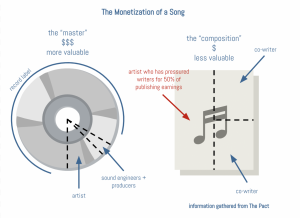Halsey reclaims her lost power in “Whispers” and establishes her throne

Wikimedia Commons
Halsey’s latest album “If I Can’t Have Love, I Want Power” walks a line between self preservation and self destruction conveyed through honest lyricism and harsh textures.
September 29, 2021
Releasing their fourth studio album “If I Can’t Have Love, I Want Power” on Aug. 27, 2021, Halsey takes us into the theatrical unveiling of their story. A story about walking a line between self preservation and self destruction; a story about having a Black father and White mother. A story about them. A story that is conveyed through honest lyricism, harsh textures, and sinister instrumental.
Halsey’s sound has always blurred the line between pop, rock, and hip hop so it was no wonder that they handed the production to Trent Reznor and Atticus Rose; an interesting departure from their previous producers that included Greg Kurstin, and Ricky Reed. An usual moment for Trent Reznor and Atticus Rose, Golden Globe and Academy awards winning film score, composing the core of Nine Inch Nails. A duo that has mastered the perfect blace between breathtaking melodies and caustic sonic texture.
Centered around the “joys and horrors of pregnancy and childbirth”, “If I Can’t Have Love, I Want Power” tries to find an identity between pop stars and goth royalty. Halsey’s soothing voice complements the harsher and caustic textures that are present throughout all the songs. They shed the image of a soft pop star trying to find a way in the harsh world and embrace and fall straight into the thick, encompassing rock sound that we had a preview of in songs like “Experiment on Me”.
Halsey seems like they are finally home in this sound; unafraid of sharing deep, dark, and visceral thoughts in their lyrics and ready to slash through the sinister synths and the suffocating guitar. Creating psychedelic gothic instrumental sounds – icy synths, panoramic piano – The NIN guys seem to want to crawl out of their comfort zone and take Halsey on the ride. The album emulates sounds that we were expecting: haunting keys and unsettling melodies creating dissonance which are further enhanced by stark piano solos. It almost seems that they are trying to shed the chilly sound that they are associated with. However, it retains the sense of doom that we have come to associate with the synths and the guitar.
“The Tradition” catapults the audience into the universe that Halsey has control of. With Halsey’s pristine vocals with a piano led opener, the song makes a grand entrance for the album as a whole.
The hypnotic power that the song holds with elegance is clear with the lack of a bass and a truth that can’t be smeared. The song sets the tone for the rest of the album: Independence, female empowerment, and a declaration of defiance.
This is followed by “Bells in Santa Fe”, which is a sharp contrast to the heaviness that felt permanent in the previous track. Incorporating feathery synths, a playful tempo, they paint a picture of someone who is running away from the suffocation that was present in the previous track.
The sincerity spills into the lyrics of “Darling” when they revisit painful memories in the folk song. Crafted around the tender guitar played by Fleetwood Mac’s Lindsey Buckingham. The song reminds me of “929” where she opens about herself in a similar manner. She revives the same magic that she created in “929”.
This album, however, is not only produced by Trent Reznor and Atticus Rose but also credits Dave Grohl, mixer Alan Moulder, session mavericks Pino Palladino and Karriem Riggins, and members of Meat Beat Manifesto. The sound of modernity – a savvy move with 20th century nostalgia plaguing popular songs more and more – seemed to haunt Halsey but with the new collaborators, Halsey has found a new sound. A happy medium between the trendy mainstream hits and the sincerity in their more personal songs; an album filled with dissonance; an album that was written when they fell in love and navigated pregnancy; an album that flips flops between self destruction and a sense of self.
As the album proceeds, the claustrophobia creeps in. “Whispers” gives voice to intrusive thoughts and doubles down on the fear that hasn’t left any of us — that we’re less than we are: “Sabotage the things you love the most / Camouflage so you can feed the lie that you’re composed of.”
“Girl is a Gun” and “You asked for this” have similar tones with ominous and crashing keys respectively. However, the theme is clear: the madness is something Halsey is ready to own. The anger that was brought out by the punishing guitar shines in these songs, and yet the rage feels controlled.
The album brings a sense of closure with the final track “ Ya’ aburnee” which translates to “you bury me” in Arabic. The songs act as odes to love, to their child, to their partner, and to themselves. The bittersweet tale their journey comes to an end with a hopeful tinge, a deep departure from the beginning of the album.
The album navigates all the tricky themes that Halsey has flirted with in the prior albums; however, in this album they bring it to life and make sure that it is pliable and relatable. At times, the two personas Halsey has adopted clashes and pushes too hard to develop an idea like the solo in “The lighthouse”. But in other cases, the two persona’s — the pop star and the goth royal — come together to bring to life a feisty, sleek song such as “I am not a woman, I’m a god”.
As Halsey moves on to a new stage in life, their music takes a turn to a different direction. This album is one of the best representations of Halsey shedding the confusion that tormented their music and embracing the carnage that surrounds them. They create a new collection of stories that encapsulates their emotional power and turmoil allowing us to relate, understand and accept those parts of us.




